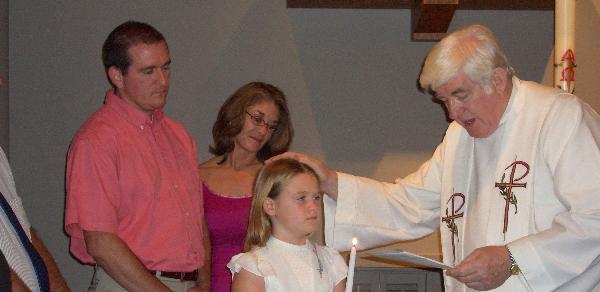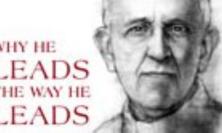Recently published research has revealed that Catholic children are being baptised later than they used to be. Michael Bossy, a Jesuit who has been baptising for over forty years, warns against jumping to any hasty or cynical conclusions about school admissions and the so-called 'Year-Five Epiphany'.
The Pastoral Research Centre Trust has recently published some statistics about the Catholic Church. One set of figures refers to 'late baptisms', those children who were baptised over the age of 1. Whereas in 1958 baptisms of children over 1 made up 5.4% of the total, in 2005 this figure reached 30.3%.
How is this huge increase in late baptisms to be explained?
Anthony Spencer, the director of the research, attributes this increase in late baptisms to "improvements in Catholic education and subsequently competition for places" in Catholic schools (Tablet, 12th January 2008, page 33). It is only when parents have to get their children into Catholic schools that many get their children baptised.
The Times (12th January 2008) followed the same line of argument in its main front page article, though in more highly coloured terms. 'New evidence that middle class parents are playing the system to get their children into church schools emerged last night.... A surge in late baptisms is reported by researchers, as part of a phenomenon known as the 'Year-Five Epiphany'. (I take this phrase to mean that children are baptised at the age of 9 - Year Five. School entry forms for secondary schools are filled in at the beginning of Year Six).
This article written by the Times Religious Affairs correspondent was published under the front page headline, 'BACKLASH AS MORECLAIM RELIGION TO GET PLACE IN TOP SCHOOLS.'
The figures and the explanation of them were understandably used by those MPs who oppose Faith Schools, as reported in the same Times article. One described the sudden trend for late baptisms as "quite alarming" and "an abuse of the human rights of the child."
The figures and the attendant inference were also used as one of the first items in the news on BBC Radio 4's Today programme on Saturday 12th January.
So that's settled. A large number of Catholics get their children baptised round about the age of 9 so that they can successfully enter them into Catholic schools. Their Catholic faith is not genuine. These white middle-class parents are only interested in getting their children into the best, top, Catholic schools. This is how the increase, surge if you prefer, in late baptisms is to be explained.
I wonder. Some years of baptising children in two large London parishes and, in one of them, of filling in school entry forms makes me wonder if that is all there is to say.
This article is written to explore these doubts a little, lest the Times' view becomes too quickly accepted as the complete and unanswerable truth.
My first and main doubt concerns a change in Catholic culture - in what Catholics naturally and unreflectively do. At an earlier stage in the life of the Catholic church, in 1958 for example, what Catholics naturally and unreflectively did was to have their children baptised at the earliest possible moment after their birth. If parents didn't insist on this, grandparents certainly would. Without baptism a child couldn't go to heaven. Delay imperilled the child's immortal soul. Urgent action was called for. I looked at the baptism register for 1958 in our parish, 111 out of the 126 children baptised in that year were baptised within three months of their birth.
This culture has now changed. For reasons I cannot fully elaborate - maybe improved child health, certainly changes in theology, probably looser community ties among Catholic parishioners - even the more devout Catholic parents do not now think that the very earliest date for their child's baptism is an essential part of Catholic practice. All of us have a less fearful attitude towards God and towards the part God plays in a child's ultimate destiny.
Once this point is conceded a number of smaller points will contribute to a delayed baptism: waiting for grandparents to book a flight from Ghana or other distant places and saving money for the party will both come in. Parents who are notably stressed or who, at the time, think of themselves as rather on the fringe of the Catholic community are quite likely to delay further.
Parishes themselves contribute to this delay. Most of them insist that parents come to meetings to prepare for the baptism of their child. This was not the case in 958. In my present parish a parent who wants to have a child baptised must first of all attend four meetings that take place over four consecutive weeks: only at the end of these meetings may the date for the baptism be fixed. Some delay is part of parish life.
Here are the figures for the dates of the baptisms in my present parish in 2006. No parish is typical, but it is a parish with one of the largest numbers of annual baptisms in the Westminster Diocese.
The total numbers of baptisms (excluding those baptised at Easter as part of the RCIA process) was 139. The ages at which these children were baptised were as follows:
|
Below 12 months:
|
52
|
Does this suggest a school age surge? Or rather a gradual spacing out?
I noticed two details: (i) Only one of the 19 children baptised over the age of 5 was aged 9. Few Year-Five Epiphanies in this parish! And (ii) 8 of the 19 children baptised over the age of 5 were from our Latin American group.
This brings me to my second point of doubt about the reasons for late baptisms. A proportion of baptisms - in many parishes a high proportion - are of fairly recent immigrants. Some have left countries of great conflict; they come to a country where they may not know the language; they haven't got a sense of the local church. It would be quite
surprising if a significant number of the immigrant members of our parish were not baptised late, only after they had settled down a bit in their new home.
It is true that there were immigrants in 1958 but I think it likely that they lived more stable lives than more recent immigrants, in London at least.
I suggest therefore that a great deal more research needs to be done before any confident inference can be drawn about the reasons for the change in the number of late baptisms from 1958 to the present day. At present it is not an argument that can be used by those who oppose Faith schools, nor to cast a general shadow over Catholic parents as they do all they
can to bring up their children.
Incidentally, in the Catholic secondary school of which I am a governor - I do not know if it is a 'top' school: it is certainly over-subscribed by Catholic children - a child who is baptised late will not ordinarily be given a place. Parents, such as there are, who have Year-Five Epiphanies, are likely to find that they have wasted their time!
Michael Bossy SJ is a former Headmaster of Stonyhurst College and currently Assistant Priest in the north London parish of St Ignatius, Stamford Hill.






